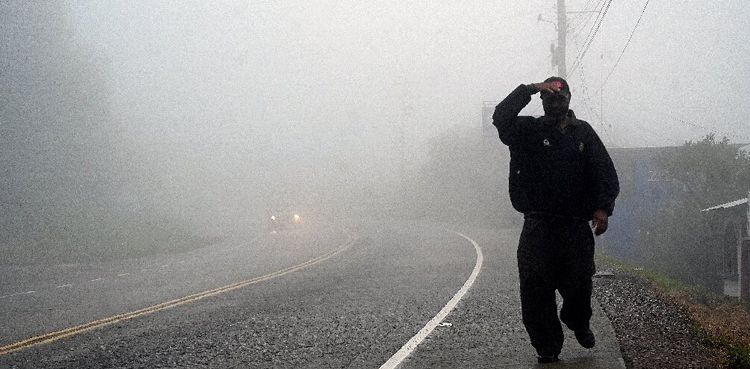
Hurricane Julia raked across Nicaragua Sunday, lashing the country with winds and heavy rain and bringing potentially life-threatening flash flooding and mudslides to much of Central America.
Maximum sustained winds were estimated at 85 miles per hour (140 kph) when the storm made landfall near the Laguna de Perlas area at 0715 GMT, the country’s weather agency said.
By late morning, the fifth Atlantic hurricane of the season had weakened slightly to a tropical storm with top sustained winds at near 70 miles per hour as it churned westward across Nicaragua.
But the US National Hurricane Center warned that Julia — whose center was some 65 miles northeast of the capital Managua at 1500 GMT — was still packing a punch, not just for Nicaragua but for neighboring countries.
“This rainfall may cause life-threatening flash floods and mudslides across Central America today and Monday,” with dangerous conditions also reaching southern Mexico, the NHC said in its latest advisory.
Julia was expected to emerge off the Pacific coast by Sunday evening, then shift northwestward to “parallel the Pacific coasts of Honduras, El Salvador and Guatemala tonight and Monday.”
Maintaining its tropical storm strength, Julia is forecast to produce five to 10 inches (12.7 to 25.4 centimeters) of rain in Nicaragua and El Salvador, with isolated pockets receiving as much as 15 inches.
Hours earlier in Bluefields, Nicaragua, one of the main coastal towns buffeted by the storm, fishermen had been busy safeguarding their boats as people rushed to buy groceries and withdraw money from ATMs.
Hurricane-force winds and heavy rains began to be felt around midnight, according to AFP photographers in the city, while state media reported detached roofs, fallen trees and power outages.
Before reaching Nicaragua, Julia passed over a trio of Colombian islands, an environment ministry official told AFP, causing rain and lightning in the country’s north.
Julia was a Category 1 hurricane, on the low side of the five-tier Saffir-Simpson wind scale, when it roared ashore in Nicaragua.
Authorities have evacuated some 6,000 people in Laguna de Perlas, in the Miskito keys located off the coast, and in other zones.
“We have to prepare with food, plastic, a little bit of everything, because we don’t know what’s going to happen,” Javier Duarte, a cabinetmaker in Bluefields, told AFP.
The municipality of some 60,000 inhabitants has many flimsy structures.
Julia’s arrival in Central America comes less than two weeks after deadly Hurricane Ian crashed into the southeastern US state of Florida, in one of the most powerful US hurricanes on record.
The Category 4 storm flattened entire neighborhoods on the Sunshine State’s southwest coast. More than 100 people were killed, according to US media.
from International News Today - Breaking News, US News, World News https://ift.tt/OgjAteL

0 Comments